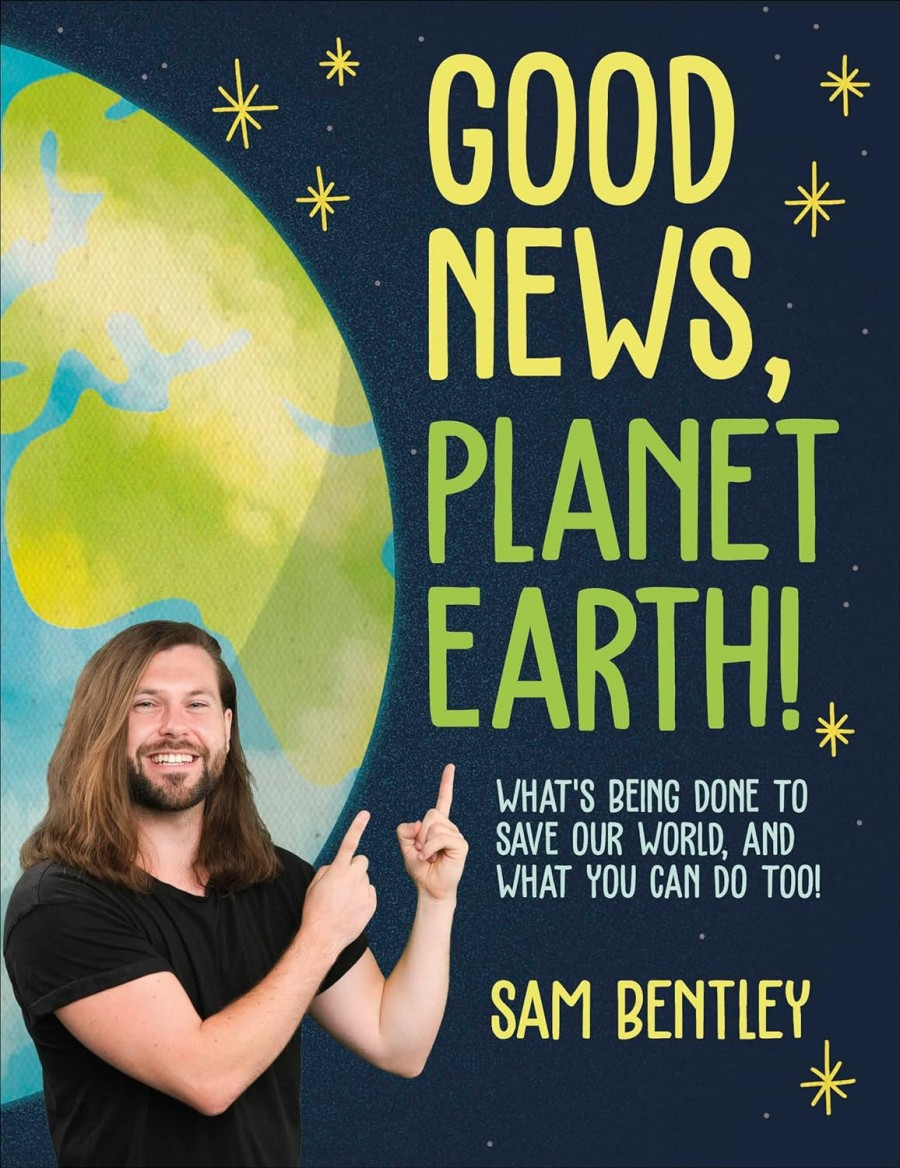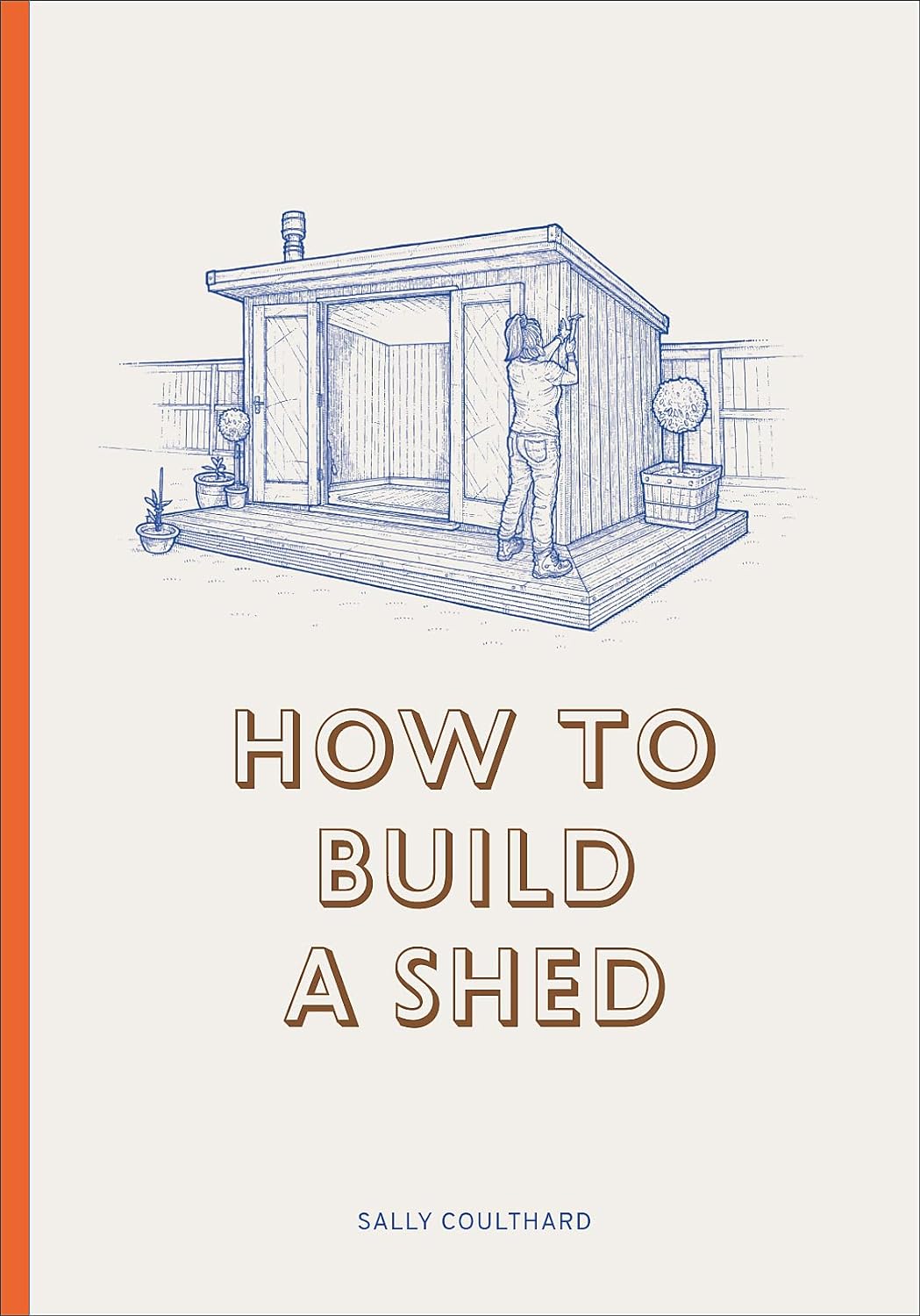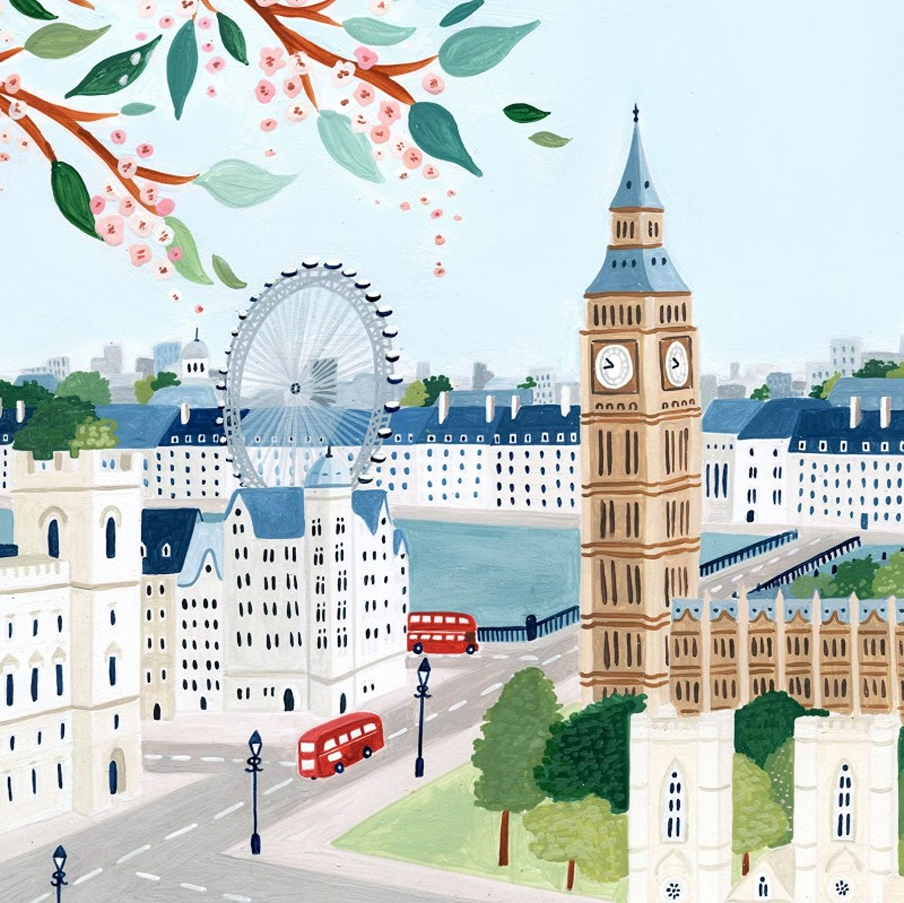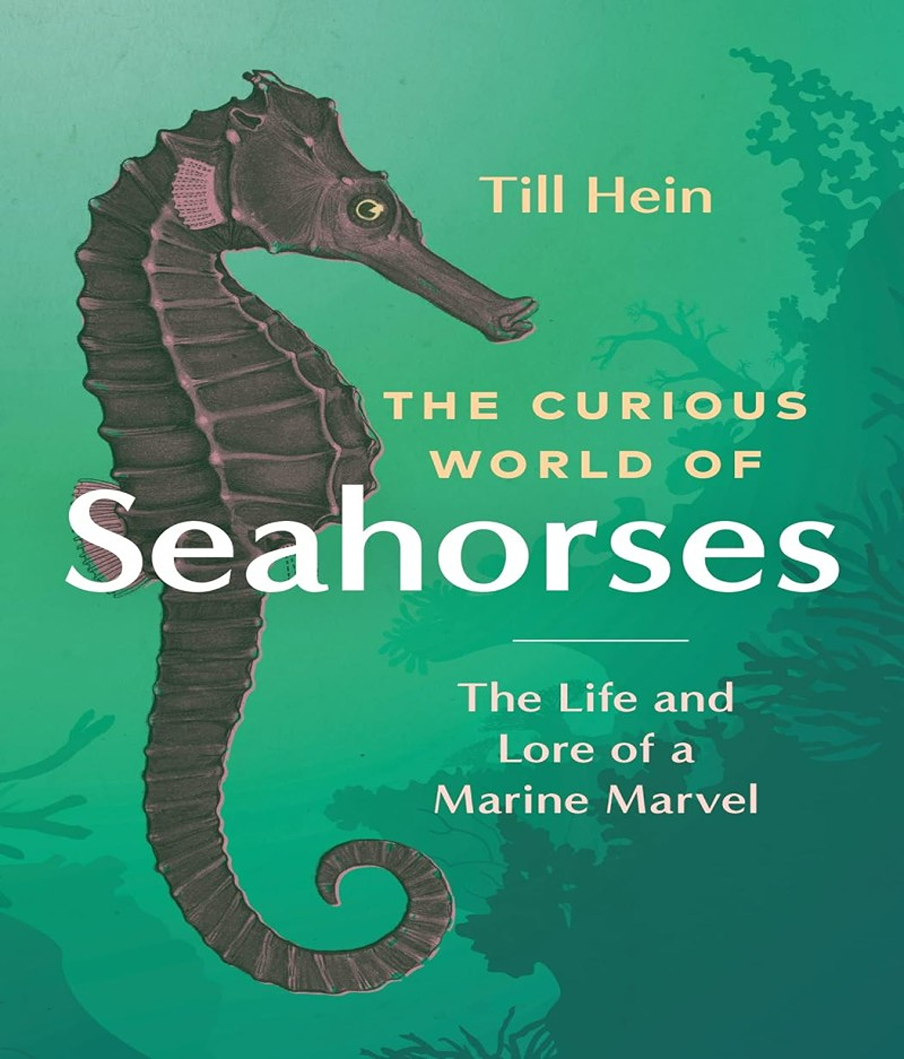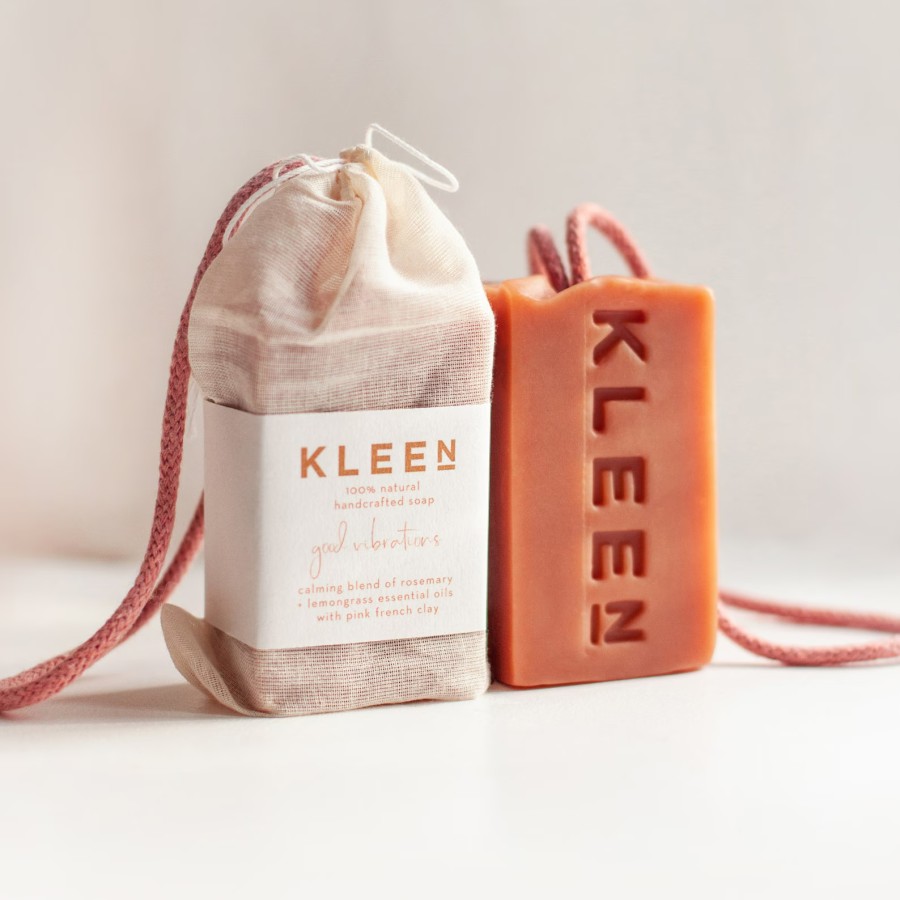
Avoid essential oils for pregnancy/nursing and affected medical conditions, and avoid shea butter for latex allergies. These soaps are suitable for most older babies (plain water is usually enough before that – check labels). Don’t use these soaps on pets due to cocoa butter and different PH – read more on bathing dogs).
Nearly all bar soaps sold in shops are made with sodium palmate (palm oil) which should be avoided to protect orangutans and other endangered creatures (there is no such thing as ‘sustainable palm oil’), this is just a self-policed marketing ploy that Greenpeace says is as ‘useful as a chocolate teapot’). Sodium tallowate means the soaps are made from beef fat. Here are some better brands. If you’re shopping on the high street, you’ll be hard-pressed to find anything bar Oliva (a cheap olive oil soap sold in all good health stores or buy in bulk online – it’s a good soap that often can heal eczema in some people).
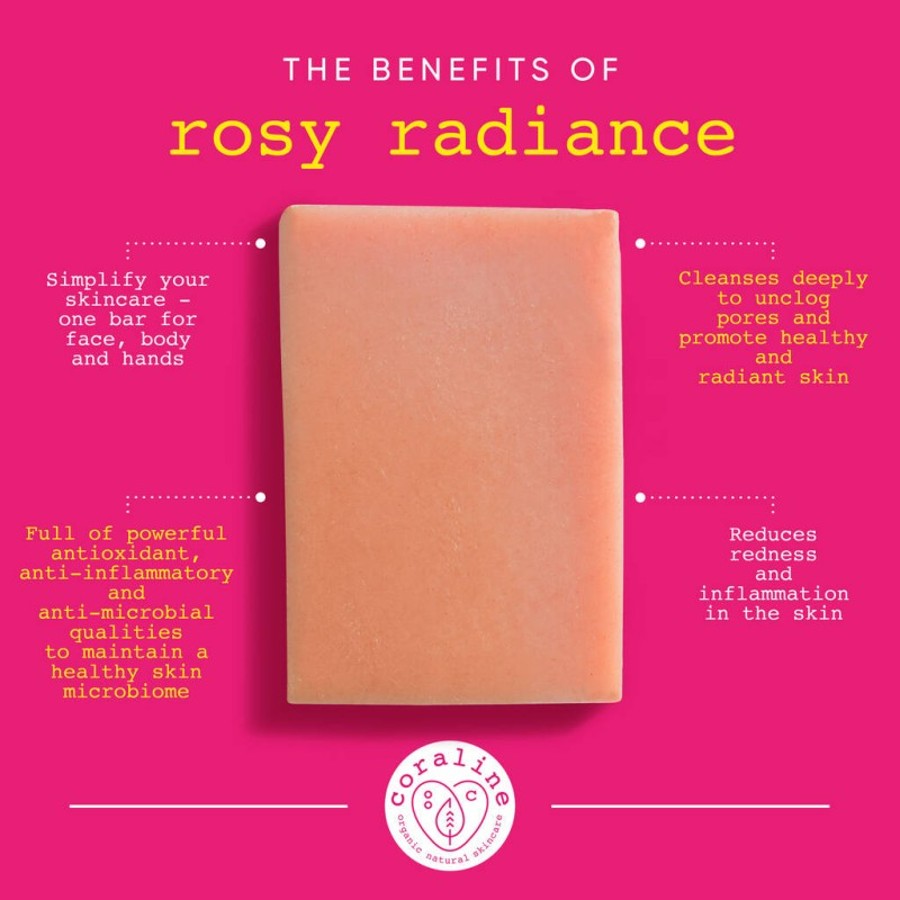
Coraline Skincare is a wonderful company that mostly sells soaps (they also offer calming oil-based lavender cleansing balm and a moisture balm (do a patch test, as immortelle oil contains natural allergens). Avoid aromatherapy oils for pregnancy/nursing or affected medical conditions. Avoid shea butter for latex allergies (keep essential oils and cocoa butter away from pets).
The company began when the parents of a little girl born with Down Syndrome, found her skin could not cope with conventional products. So they developed their own, which have become the go-to brand for people with sensitive skin. A couple are scent-free (chamomile or nettle) and others are scented with real essential oils. Proper handmade soap does not dry your skin as the moisturising glycerine is retained. As the soaps are quite soft after a few uses, store on a slatted soap dish to dry out between uses, to help them last longer. The range includes:
- Chamomile & yarrow (calming)
- Nettle & calendula (also calming)
- Rose geranium (mature skin)
- Lavender (organic & relaxing)
- Cinnamon, oat, almond (exfoliating)
- Mint lemon charcoal (oily skin)
It’s important to choose skincare with biodegradable ingredients (no fragrance oils) so items break down safely when they are rinsed down the drain, and go into the sea. Don’t pour neat essential oils down drains, these can still harm, safely dispose of in the trash. Your lifestyle is more important than what you put on your skin. So lots of water (over wine!), good food (with lots of plant-based protein and not too much refined sugar, gluten) along with regular sleep and gentle exercise, a bit of fresh air and avoiding stimulants (coffee, cigarettes, alcohol etc). These steps alone with transform your skin quickly.
Skin renewal eventually begins to slow down as we age, which is why dermatologists recommend regular exfoliation as likely being more important than slapping on moisture creams (most of which are mostly water anyway, so evaporate on your skin). If a product boasts itself as ‘age-defying’ or ‘wrinkle-reducing’, that’s usually a good reason to avoid it, as it will be packed with chemicals. Just spend a little more on quality items, but use less of them. Try all of the above tips combined for a month, and see how you get on, tweaking your beauty routine.
how to stop soap bars going squishy
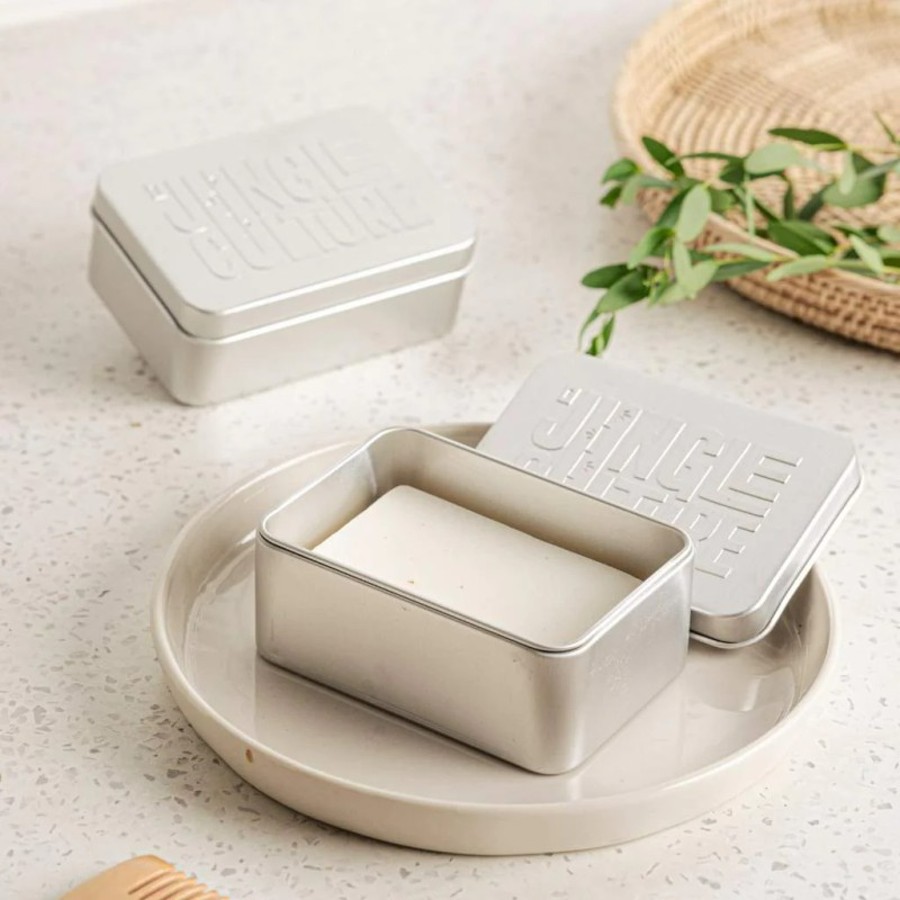
This stackable metal soap tin can be used for soaps, shampoo and shaving bars, designed to last a lifetime, and perfect for the gym, camping or backpacking. It has a drip tray to prevent soap pooling in water, just remove to clean and rinse under warm water. Once shut, the clamp keeps it shut.
shower-friendly (vegan) soaps on ropes!
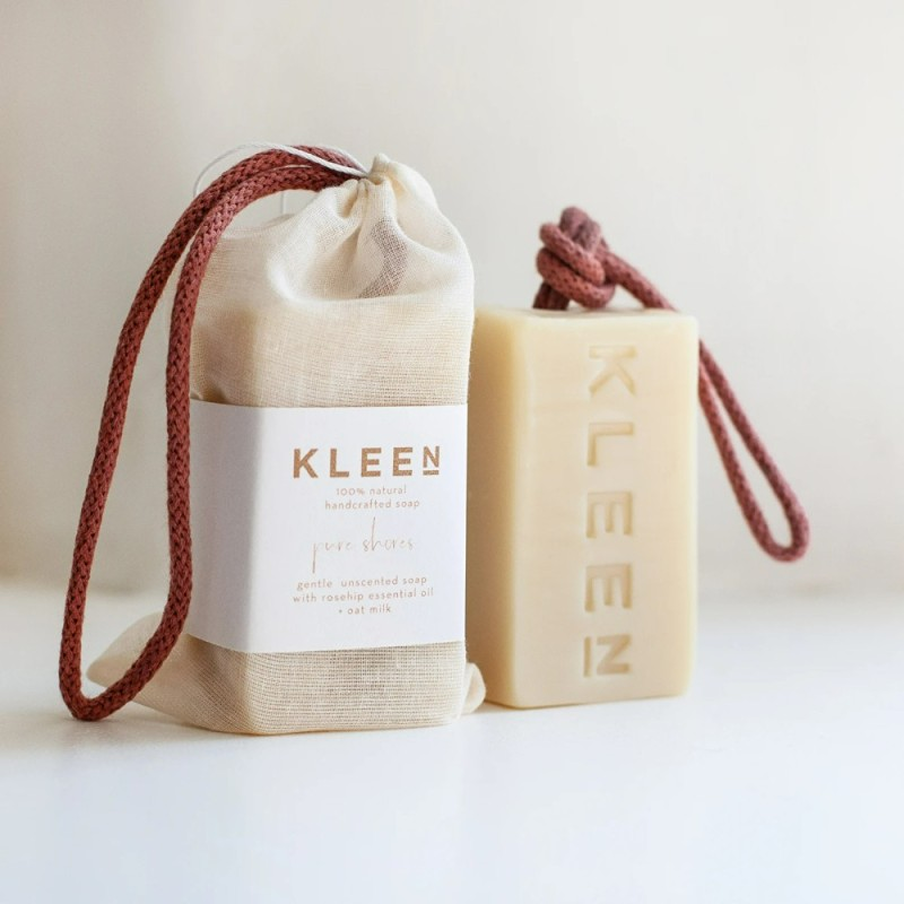
Kleen soap is vegan and free from palm oil, and includes a cotton rope, so you can hang it up after use in the shower to drain away water, saving the need to buy a soap tin, to stop it going smushy! Also available in Italian floral (pine, palmarosa, lime and ylang ylang and activated charcoal & kaolin clay.
a 3-ingredient vegan soap for sensitive skin
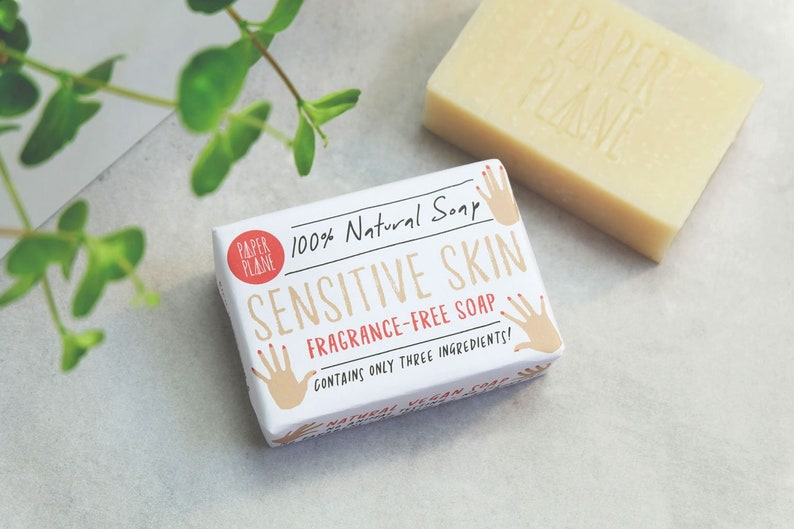
This sensitive skin soap contains just 3 ingredients and no fragrance. Free from palm oil and vegan, this soap is sold in easy to recycle paper packaging. Made with olive & coconut oils (for lather) and nourishing shea butter (avoid for latex allergies).
These soaps are worlds away from supermarket & chemist soaps, which tend to remove the naturally moisturising glycerine, to sell to industry. When people say that ‘soap dries your skin’, they are not talking about handmade soap. Try using nothing but this for a month, and notice the difference. Your skin will be so naturally moisturised, you may not even need to use a skin cream.
Unlike most soaps, this is also free from palm oil (so helps to protect the habitats of orangutans & other endangered species). Nearly all soaps in supermarkets & chemists contain palm oil (labelled as ‘sodium palmate’). Other soaps contain sodium tallowate (beef fat).
rose geranium vegan soap for gardeners
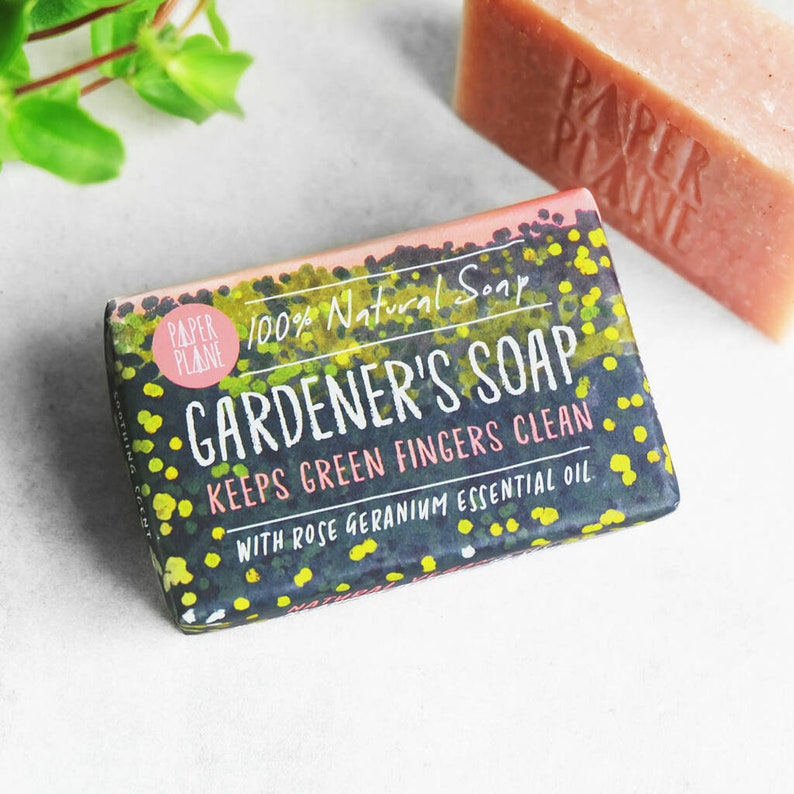
This rose geranium soap for gardeners is ideal for women who wish to smell a little more feminine, after spending all day with their hands in dirt! Free from palm oil and vegan, this soap is sold in easy to recycle paper packaging. Made with olive & coconut oils (for lather) and nourishing shea butter (avoid for latex allergies), it’s scented with real essential oils. Avoid essential oils for pregnancy/nursing, affected medical conditions and keep away from young children & pets.
These soaps are worlds away from supermarket & chemist soaps, which tend to remove the naturally moisturising glycerine, to sell to industry. When people say that ‘soap dries your skin’, they are not talking about handmade soap. Try using nothing but this for a month, and notice the difference. Your skin will be so naturally moisturised, you may not even need to use a skin cream.
Unlike most soaps, this is also free from palm oil (so helps to protect the habitats of orangutans & other endangered species). Nearly all soaps in supermarkets & chemists contain palm oil (labelled as ‘sodium palmate’). Other soaps contain sodium tallowate (beef fat).
a vegan charcoal soap for teen skin
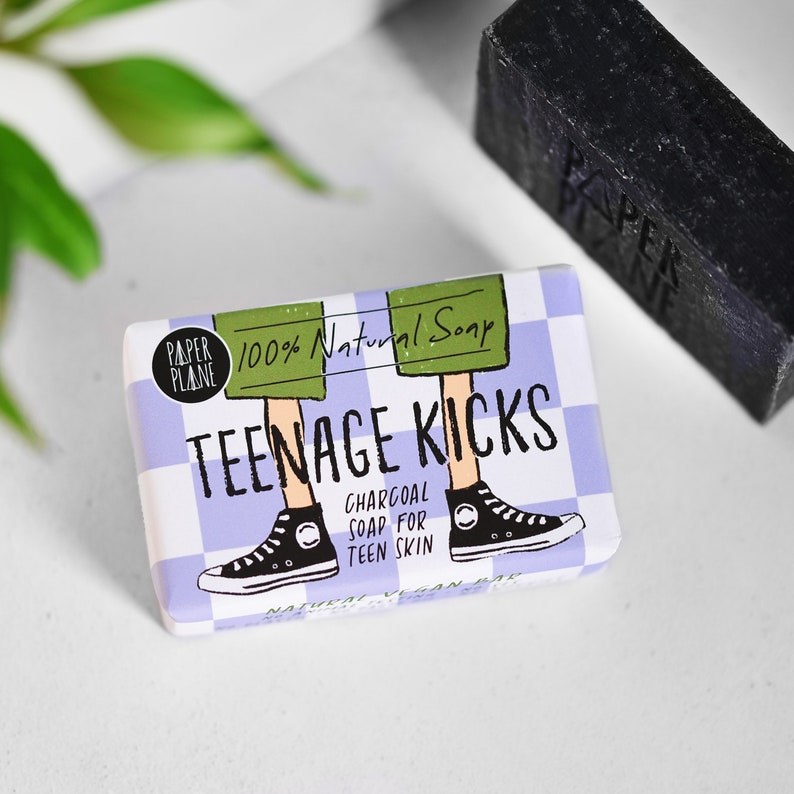
This charcoal soap for teen skin is made with oils of citrus and rosemary, along with charcoal that is great to absorb oil, in acne-prone skin. Free from palm oil and vegan, this soap is sold in easy to recycle paper packaging. Made with olive & coconut oils (for lather) and nourishing shea butter (avoid for latex allergies), it’s scented with real essential oils. Avoid essential oils for pregnancy/nursing, affected medical conditions and keep away from young children & pets.
These soaps are worlds away from supermarket & chemist soaps, which tend to remove the naturally moisturising glycerine, to sell to industry. When people say that ‘soap dries your skin’, they are not talking about handmade soap. Try using nothing but this for a month, and notice the difference. Your skin will be so naturally moisturised, you may not even need to use a skin cream.
Unlike most soaps, this is also free from palm oil (so helps to protect the habitats of orangutans & other endangered species). Nearly all soaps in supermarkets & chemists contain palm oil (labelled as ‘sodium palmate’). Other soaps contain sodium tallowate (beef fat).
a bar of vegan soap to help you sleep
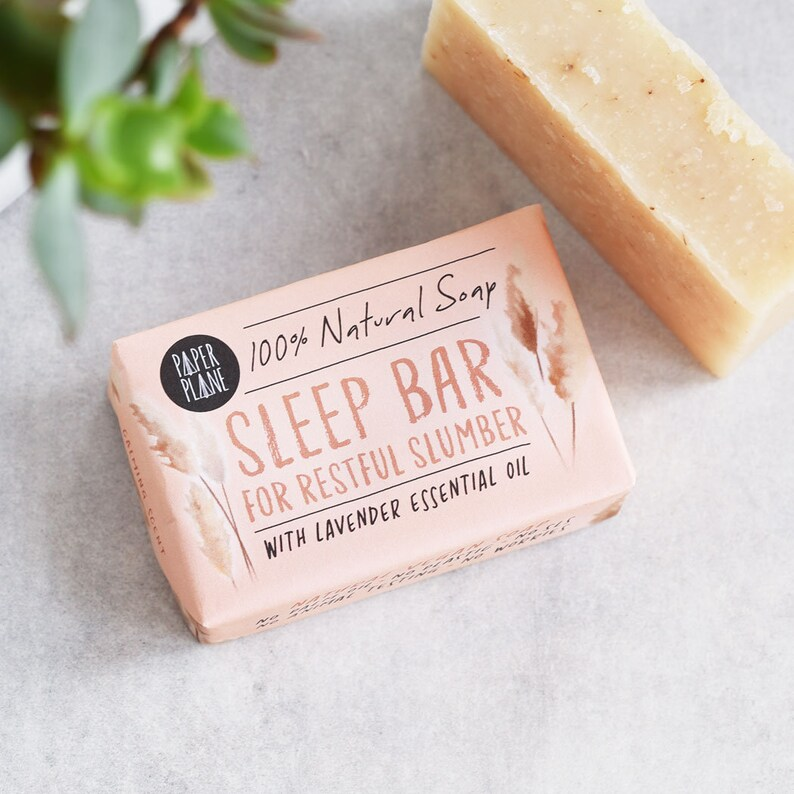
This lavender sleep soap is made with real oil of lavender, and is also vegan and free from palm oil, sold in easy to recycle paper packaging. Made with olive & coconut oils (for lather) and nourishing shea butter (avoid for latex allergies), it’s scented with real essential oils. Avoid essential oils for pregnancy/nursing, affected medical conditions and keep away from young children & pets (don’t use if pets sleep on your bed).
These soaps are worlds away from supermarket & chemist soaps, which tend to remove the naturally moisturising glycerine, to sell to industry. When people say that ‘soap dries your skin’, they are not talking about handmade soap. Try using nothing but this for a month, and notice the difference. Your skin will be so naturally moisturised, you may not even need to use a skin cream.
Unlike most soaps, this is also free from palm oil (so helps to protect the habitats of orangutans & other endangered species). Nearly all soaps in supermarkets & chemists contain palm oil (labelled as ‘sodium palmate’). Other soaps contain sodium tallowate (beef fat).
a calming rose & geranium vegan soap
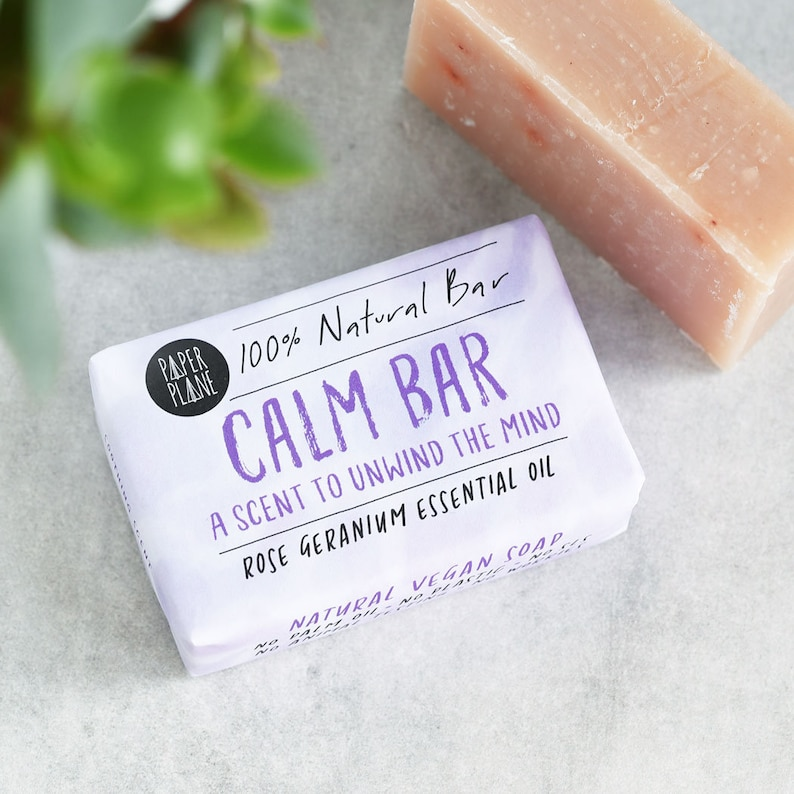
This calming soap is made with oils of rose and geranium, and is also vegan and free from palm oil, sold in easy to recycle paper packaging. Made with olive & coconut oils (for lather) and nourishing shea butter (avoid for latex allergies), it’s scented with real essential oils. Avoid essential oils for pregnancy/nursing, affected medical conditions and keep away from young children & pets.
These soaps are worlds away from supermarket & chemist soaps, which tend to remove the naturally moisturising glycerine, to sell to industry. When people say that ‘soap dries your skin’, they are not talking about handmade soap. Try using nothing but this for a month, and notice the difference. Your skin will be so naturally moisturised, you may not even need to use a skin cream.
Unlike most soaps, this is also free from palm oil (so helps to protect the habitats of orangutans & other endangered species). Nearly all soaps in supermarkets & chemists contain palm oil (labelled as ‘sodium palmate’). Other soaps contain sodium tallowate (beef fat).
a natural vegan soap for bakers
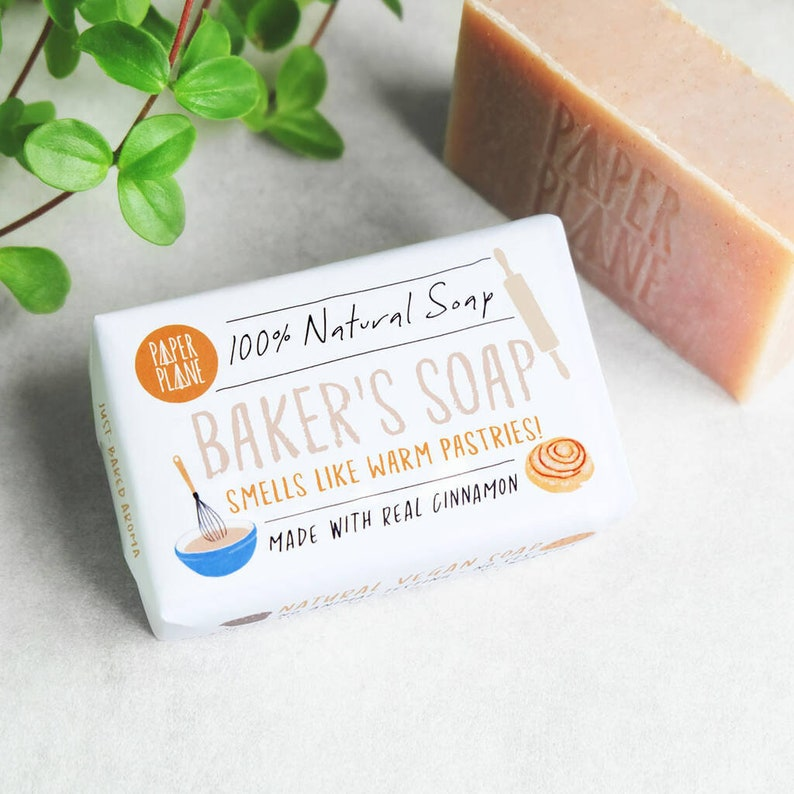
This natural vegan baker’s soap is made with all-natural ingredients and free from palm oil, sold in easy-to-recycle paper packaging.
This natural, vegan, plastic-free soap smells like freshly baked cinnamon buns – perfect for anyone who loves to bake. A great way to clean floury fingers, it’s made with olive and coconut oils (for lather) and skin-soothing shea butter (avoid for latex allergies). Scented with oil of cinnamon leaf (keep away from pets, use an unscented soap if furry friends are nearby).
These soaps are worlds away from supermarket & chemist soaps, which tend to remove the naturally moisturising glycerine, to sell to industry. When people say that ‘soap dries your skin’, they are not talking about handmade soap. Try using nothing but this for a month, and notice the difference. Your skin will be so naturally moisturised, you may not even need to use a skin cream.
Unlike most soaps, this is also free from palm oil (so helps to protect the habitats of orangutans & other endangered species). Nearly all soaps in supermarkets & chemists contain palm oil (labelled as ‘sodium palmate’). Other soaps contain sodium tallowate (beef fat).
an upcycled coconut husk soap rest
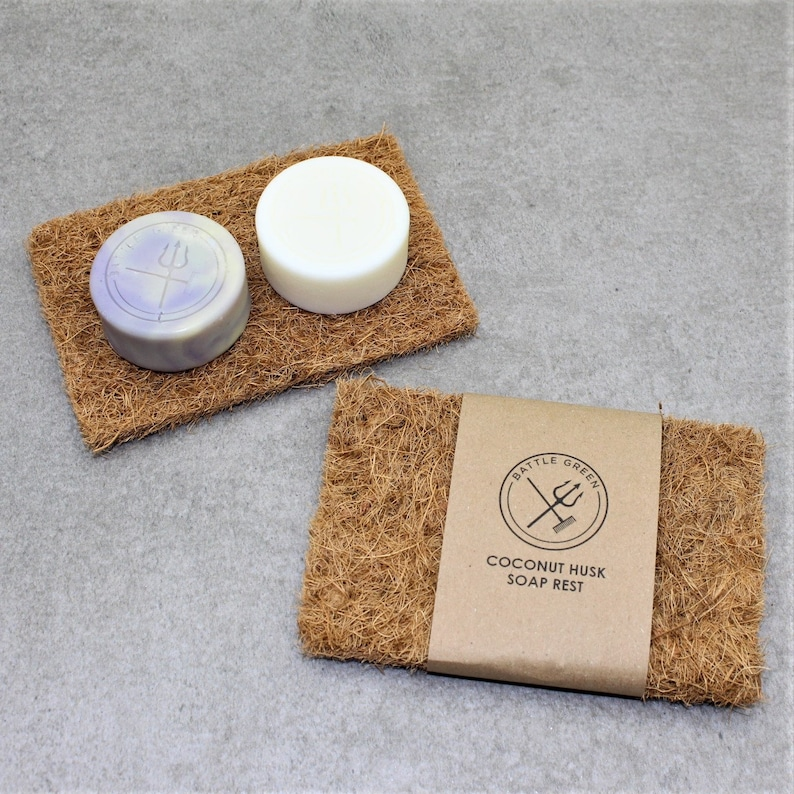
This upcycled coconut husk soap rest is ideal to store your favourite bar of handmade soap, to drain water so it doesn’t go all soft and mushy. Handmade soap is far better, but as retains natural glycerine, it’s important to ensure it’s stored away from water. Choose unscented bars for pregnancy/nursing and affected medical conditions.
The fibres in this soap rest let soap (and shampoo/conditioner) bars dry out between uses, ensuring they last much longer. Solid bars last far longer (and are also good when travelling to avoid restrictions on liquids). These soap rests are sold in small or large size, to fit most soaps (and dish soaps for the kitchen sink too). The large rest is ideal to store two bars side-by-side. Due to natural fibres, some minor shedding may occur when you first use them. Note that these are not the same as coconut fibres used to wash dishes, different product! Sent in zero waste packaging.
unscented oatmylk soap (on a rope)
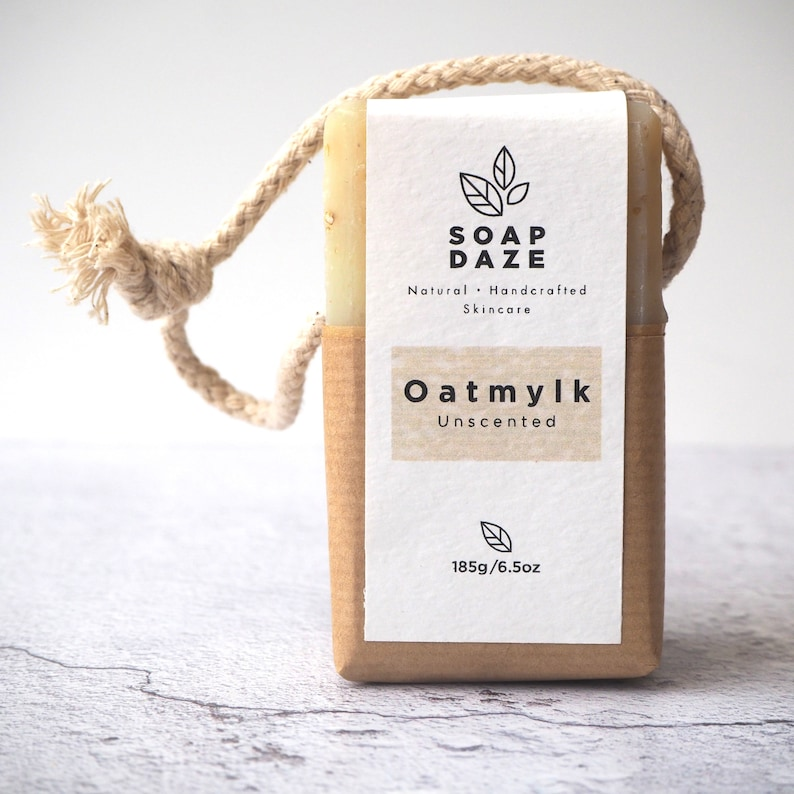
This bar of oatmylk soap is large and chunky, and ideal for the shower, as it lets gravity drain water, due to being sold on a rope (so no soap dish is needed). Unscented soaps are ideal for pregnancy/nursing and affected medical conditions, and also ideal for people with sensitive skin and conditions like eczema or psoriasis. Avoid shea butter for latex allergies (the shop page shows ‘bergamot’ as an ingredient, but this appears to be a typo, due to the full ingredients list below).
Oats have been used for thousands of years to heal sensitive skin, and are naturally moisturising. You can also save £1 by choosing an ‘unwrapped soap’ without the paper packaging.
These soaps are worlds away from supermarket & chemist soaps, which tend to remove the naturally moisturising glycerine, to sell to industry. When people say that ‘soap dries your skin’, they are not talking about handmade soap. Try using nothing but this for a month, and notice the difference. Your skin will be so naturally moisturised, you may not even need to use a skin cream.
Unlike most soaps, this is also free from palm oil (so helps to protect the habitats of orangutans & other endangered species). Nearly all soaps in supermarkets & chemists contain palm oil (labelled as ‘sodium palmate’). Other soaps contain sodium tallowate (beef fat).
a vegan shower soap (on a rope!)

A good bar of shower soap (vegan and with no palm oil) is good, but choose ones on ropes that let gravity dry them out, to stop soaps going mushy in wet environments. Also in pink clay lemongrass, Italian floral and activated charcoal.
Avoid essential oils for pregnancy/nursing and affected medical conditions, and keep items away from young children and pets. Never pour neat essential oils down sinks, showers or drains as it can harm aquatic life.

You don’t need stupid gadgets like ‘timers’. If you like a long shower, so be it. Some people like a few minutes, others spend 10 minutes or more. Although most people shower in the morning, some people prefer to wind down in the evening with a warm shower (ideal say if you practice yoga) or have insomnia.
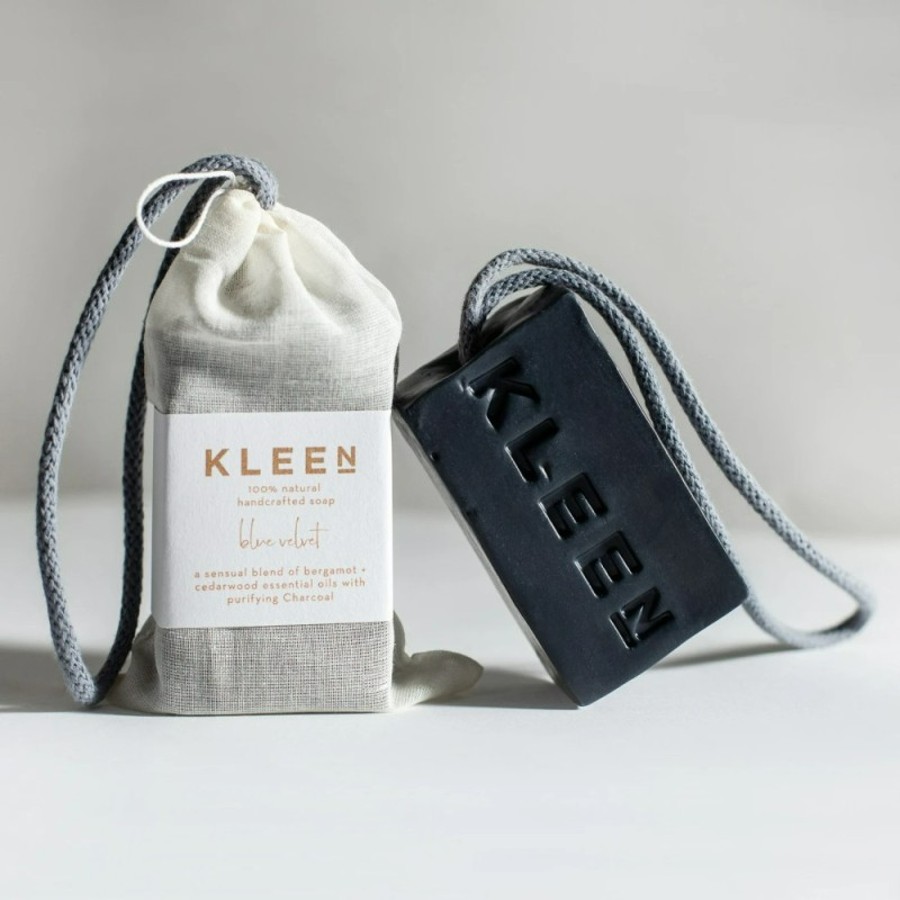
Konjac bath/shower sponges are made from a Japanese potato and don’t leach microplastics like synthetic sponges (natural sea sponges are from living creatures, cut away from seabeds by divers). These sponges are eco-friendly and cruelty-free and be cut up and composted, at end of use.


